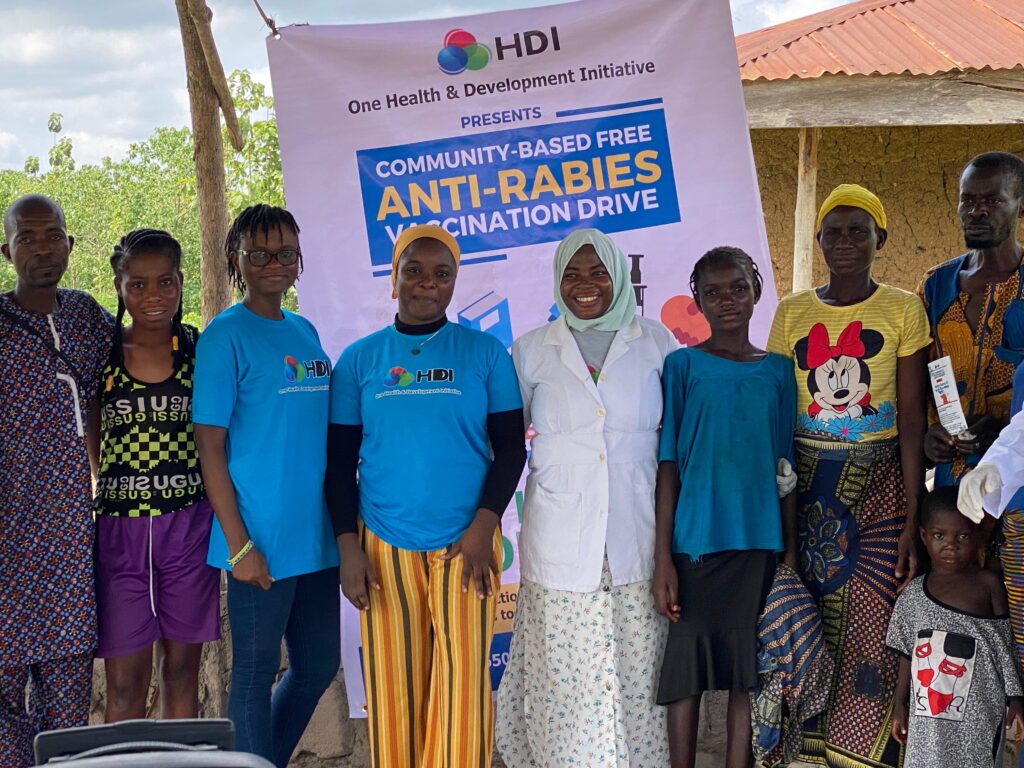
Introduction and Background on Rabies in Nigeria
Each year, more than 59,000 people die from the fatal disease rabies. The majority of these fatalities take place in sub-Saharan Africa and India. Over 99% of human rabies cases are caused by dog bites, making dogs the main carrier of this disease. The rabies virus, which can infect people as well as warm-blooded animals, is to blame for rabies.
The brain and spinal cord are its main targets, which causes damage to the nervous system and anomalies. Humans who experience rabies’ clinical symptoms nearly die as a result, with very little possibility of recovery. Therefore, preventing dog rabies is essential in the battle against human rabies. Mass vaccination efforts directed towards dogs are one of the proven strategies to stop the disease’s spread and this approach has successfully eradicated rabies in many regions of the world.
The World Health Organization suggests a yearly vaccination rate of 70% for the canine population in places where the disease is endemic in order to accomplish the target of eliminating dog-mediated human rabies deaths by 2030. Although this strategy has shown to be beneficial, several barriers prevent its application in many parts of the world. To safeguard both human and animal populations from the terrible effects of rabies, overcoming these difficulties continues to be a top concern.
OHDI’s Activities to Combat Rabies
OHDI utilizes the One Health approach in its efforts towards ensuring optimal health for all in Nigeria. Our goal is to improve the health and wellbeing of animals and people by providing interventions through an integrated approach that understands the connections between the health of humans, animals, and the environment. In rabies prevention and control, we utilize this approach in our efforts including anti-rabies mass vaccination for pets and strays, and awareness and education on rabies in communities and schools to foster behavioral change and better pet health and welfare.
Since 2022, we have implemented an Anti-Rabies Vaccination Drive to protect the dogs presented from rabies and also create awareness about the disease. This program adopted the One Health strategy which embedded improving the health of the people, animals, and the environment. This project held profound significance in controlling the primary source of rabies within these communities; the stray dogs on the streets.
Also, we raise awareness in rural communities about rabies, the One Health approach, the risks of rabies for both people and animals in these communities, and the prevention and control measures. Lastly, we stress the importance of vaccination of dogs in communities.
School Outreach, Awareness and Engagement
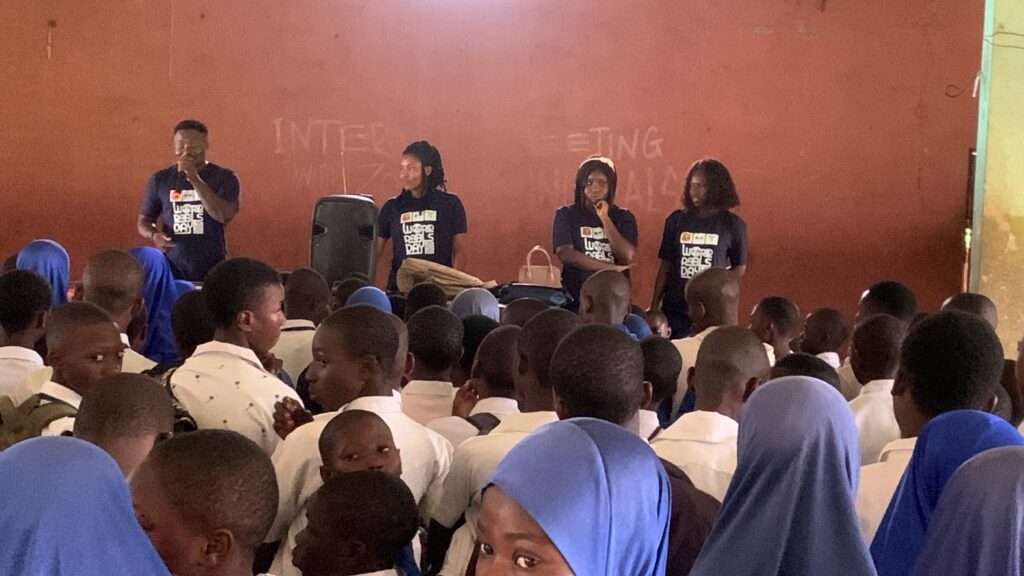
In 2022, OHDI commemorated World Rabies Day with a comprehensive rabies sensitization campaign in schools, a free anti-rabies vaccination drive, and sensitization via social media, radio, and a webinar. The initiative officially began on the 26th of September 2022 with the free anti-rabies vaccination drive, marking an essential milestone in our ongoing efforts to address Neglected Tropical Zoonotic Diseases (NTDs), which remain a significant concern in public health.
On 27th September 2022, we conducted rabies sensitization in two public secondary schools in Ibadan. This campaign was aimed at educating the students on rabies as a zoonotic disease, the risks/dangers associated with contracting rabies from their pets (dogs), and the control and prevention of rabies.
At the end of the campaign, we were able to educate 2347 students in Oladipupo Alayande School of Science Ibadan and Oke-Bola Comprehensive High School in Ibadan, Nigeria. We also gave the students our brochures containing simplified but comprehensive information on rabies.
Aside from this, we utilized social media to encourage youth involvement in rabies prevention and control, and educated people via our webinar which focused on the current achievements and gaps in the one health action against rabies eradication. This webinar enlightened the members of the public on how One Health Action can be leveraged to eradicate Rabies by 2030.
Recognizing the importance of reaching a diverse audience, including those without internet access, we also implemented a series of radio jingles. These jingles disseminated accurate information regarding rabies control and prevention, serving as an additional channel to keep communities informed. These also encouraged dog owners to bring their pets for examination and vaccination during the World Rabies Day campaign, ultimately contributing to rabies prevention and control, and optimal animal health.
Community Outreach, Awareness and Engagement
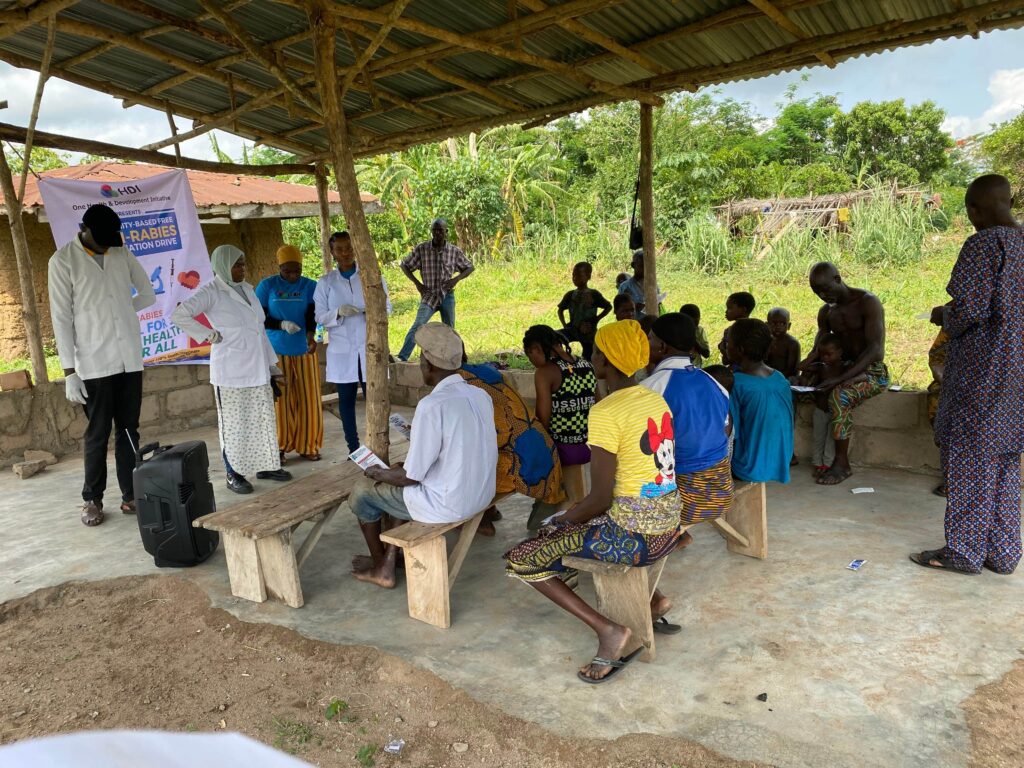
Our first rabies community outreach was carried out in 4 communities in Akinyele and Atakumosa Local Government Area (LGAs) in Oyo and Osun state on the 3rd and 5th of November 2022 respectively. These communities include Ijaye, Seriki, Ojutaiye and Osu communities. During these visits, we utilized fliers, banners and translated brochures to educate the community members about rabies.
Although about 50% of the dog owners reported that they heard about “arun digbolugi” on radio, we realized that there was a significantly low level of awareness about the risks associated with rabies, and the need for vaccination in the communities. For example, about 85% of the community dwellers were not aware of the dangers unvaccinated dogs expose them to at the time the outreach was conducted. Furthermore, some of the questions asked during the sensitization include: “Does Rabies affect cats too??” My dog is not sick, how do I know it has Rabies?? “When bitten by a dog what should we do?”, “What can we do to get rid of Rabies?”, “Is there a drug for treating rabies?”, “Does Rabies Kill?”. These knowledge gaps highlight the need for continuous awareness efforts in rural communities across Nigeria.
In 2023, we implemented similar projects in 7 communities in Afijio and Akinyele LGAs to educate the residents on rabies, its impact, zoonotic transmission, risk factors, prevention and control, and the importance of routine pet vaccinations. These communities include Jarija, Dalute, Idi-Ayan, Kege Oke, Sangobon, Fiditi and Ilora. This helped us reach communities in rural regions with limited access to the internet and also fostered community involvement and engagement in One Health solutions.
We utilized open dialogues and quality information, education, and communication (IEC) materials including banners, flyers, and jingles to effectively convey the message. To ensure effective communication, these materials were translated to the native language of these communities – Yoruba, and distributed to the community members. Similarly, all sensitization messages were translated and delivered in Yoruba language including the pre-recorded jingle used to rouse the residents’ interest in the event.
During our sensitization programs, community members were engaged through question-and-answer sessions where they were rewarded with gifts for their participation. This approach fostered the inclusion of local community stakeholders and strengthened the bond between the campaign and the community members.
We also encouraged attendees of these programs to report bite or scratch wounds from dogs as soon as possible (as emphasized in our brochure on Rabies). Furthermore, they were encouraged to disseminate this information to their acquaintances.
Pet Vaccination and Veterinary services
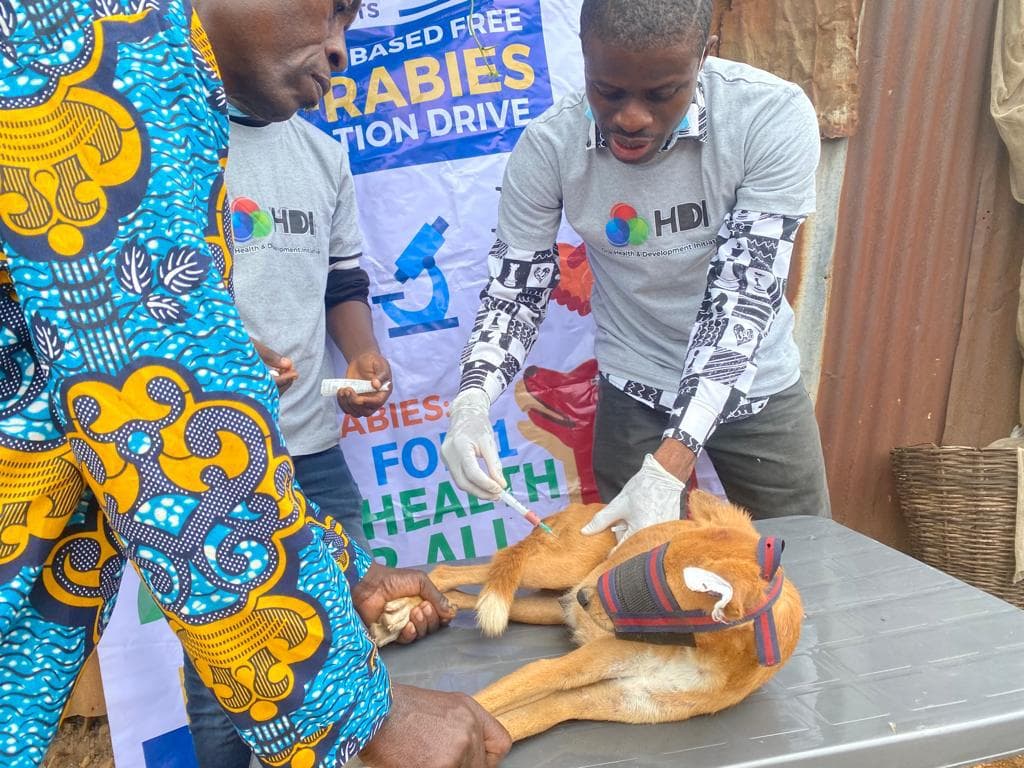
Alongside our awareness efforts during World Rabies Day 2022, we also initiated a free anti-rabies vaccination drive in Ibadan in collaboration with the Veterinary Teaching Hospital, University of Ibadan. During this program, we vaccinated a total number of 93 including 90 dogs and 3 cats. This was continued as the Project Eliminate Rabies on the 3rd and 5th of November, 2022.
Alongside our awareness efforts in the visited communities, we vaccinated a total of 150 pets including 145 dogs and 5 cats in Ijaye, Seriki, and Ojutaiye communities in Akinyele Local Government Area, Oyo State, and Osu community in Atakumosa Local Government Area (LGA), Osun State.
In 2023, we coordinated similar efforts in 7 communities in Akinleye and Afijio LGAs in Oyo State. The communities include Jarija, Dalute, Idi-Ayan, Kege Oke, Sangobon, Fiditi and Ilora.
We vaccinated a total of 120 pets including dogs and cats in these communities. We also provided veterinary services for a total of 100 ruminant animals including goats, sheeps and rams in some communities in the form of administration of PPR (Peste des petits ruminants) vaccines, and dewormed 30 puppies and 50 juvenile animals at Fiditi and Ilora communities in Afijio LGA of Oyo State.
All the vaccinated dogs were also dewormed using a broad spectrum dewormer with anti-ectoparasitic activity alongside the ruminants. Young puppies presented who were less than 8 weeks old were not vaccinated against rabies but were dewormed. This ensured that a wider range of animals received proper care and protection.
Furthermore, our campaign team collected Water, Sanitation, and Hygiene (WASH) data from leaders of major bodies in these communities. This will inform targeted future WASH interventions to improve the community’s health and hygiene conditions.
Achievements and Impact
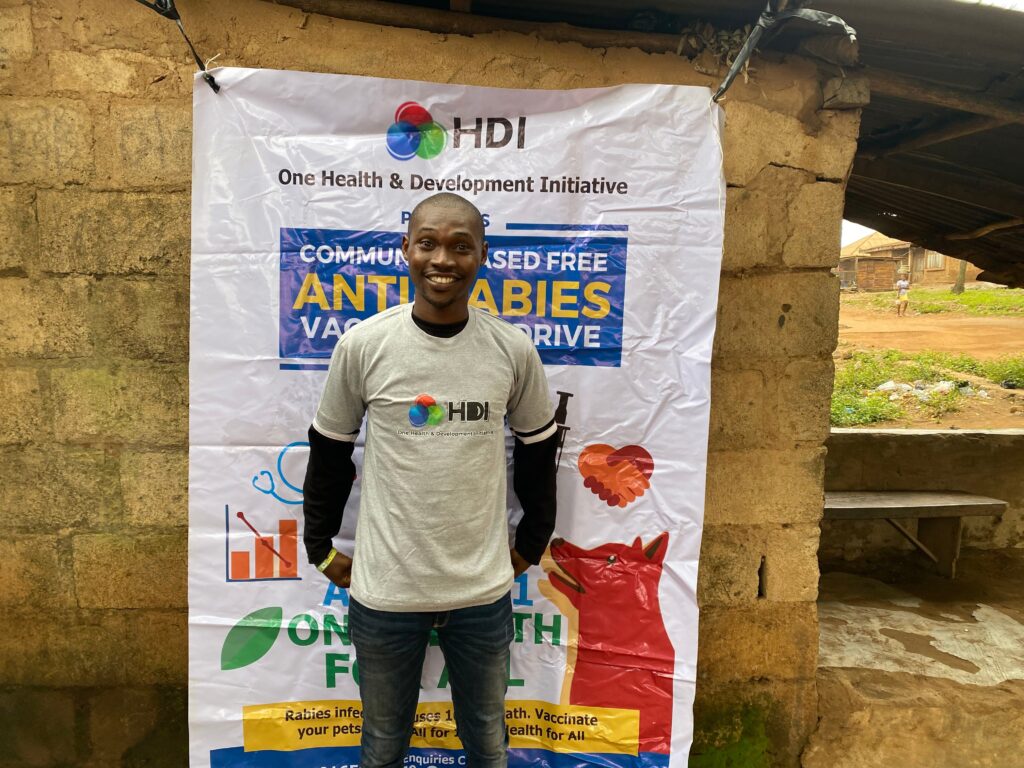
Through our awareness efforts, we have educated 2,797 people including 166 pet owners in 11 communities and 2 secondary schools across 3 LGAs in Osun and Oyo states. Our audience was educated and engaged on the zoonotic significance of rabies, its dangers, the prevention and control measures, and the importance of vaccination.
Through our conversations with them, we identified significant gaps in awareness of rabies. For example, during some of the sensitization sessions in communities, questions asked include “Does Rabies affect cats too?” “How can I know if my seemingly healthy dog has Rabies?” “What should be done when bitten by a dog?” “What measures can we take to eradicate Rabies?” “Is there a treatment for Rabies?” and “Does Rabies cause death?” This suggests limited knowledge of rabies and its risk factors. Also, some of the community dwellers were unaware of the dangers posed by unvaccinated dogs at the time of the outreaches.
This was addressed using our IEC materials which provided accurate information on rabies, its dangers, risk factors, and its prevention and control measures in their native language – Yoruba. We also encouraged responsible animal welfare practices amongst the pet owners and emphasized the importance of vaccination.
Aside from awareness campaigns in schools and communities, we also used a webinar and social media campaign to educate more than 450 people about rabies. This was complemented by our radio broadcast to 1.9 million persons in Nigeria.
To complement our awareness efforts, we provided free vaccinations in the visited communities. Prior to our visits, the majority of the pets presented had never received ARV (Anti-Rabies Vaccine) shots, hence unprotected against rabies. In response, we have vaccinated a total of 363 pets including 354 dogs and 9 cats. We also provided free veterinary services to 180 animals including goats, sheep, rams, puppies and other juvenile animals.
Renewed Commitment and Next Steps to Combat Rabies
As an organization with the focus area on public health, OHDI remains committed to contributing to efforts towards achieving global rabies eradication in 2030.
Our projects’ outcomes highlight the importance of continuous education and actions in controlling and eradicating rabies. Hence, we will continue to promote responsible pet ownership, coordinate routine vaccinations, and advocate for easier access to Pre-exposure prophylaxis (PrEP) and Post-exposure prophylaxis (PEP) for those at risk. We also plan to increase awareness efforts through use of radio announcements and social media as well as promoting the adoption of the One Health approach.
We believe these efforts in coordination with government efforts in providing access to PrEP and PEP for populations at risk, increased surveillance and monitoring of Rabies cases, awareness campaigns and outreaches, and enforcement of responsible pet ownership practices will aid in eradicating rabies in Nigeria. We also recommend the adoption of the One Health approach as it provides holistic solutions to rabies prevention and control and also promotes good pet health and welfare.





